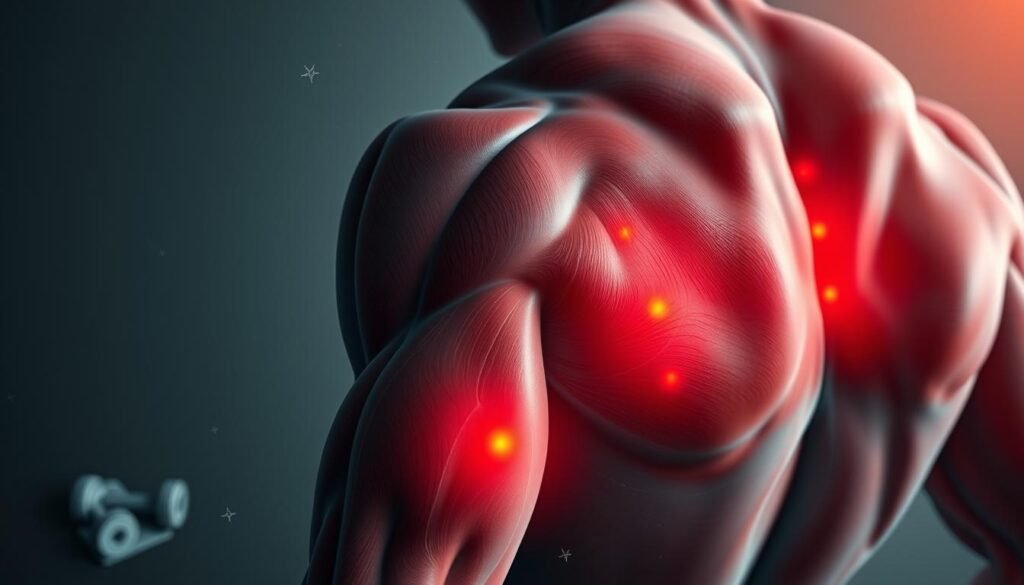Did you know around 70% of athletes feel very tired after working out? This is often because they’re not drinking enough water or they’re not recovering properly. Knowing how long you should feel tired after exercising is key. It helps you get better faster and handle exhaustion right. No matter if you’re new or experienced in sports, knowing how long to rest and what affects your recovery is crucial. This guide will cover symptoms after working out, why drinking water and eating right matter, and how taking breaks helps your health. We’ll look into recent studies on managing tiredness. This will help you learn how to balance pushing yourself and resting.
Key Takeaways
- Post-workout fatigue can often indicate issues like dehydration or inadequate nutrition.
- Understanding the normal duration of fatigue and recognizing signs of overtraining is crucial.
- High-intensity workouts can lead to lactic acid buildup, impacting energy levels.
- Chronically insufficient sleep can prolong recovery time and exacerbate feelings of fatigue.
- Effective post-exercise recovery strategies can significantly enhance overall wellness.
Understanding Post-Workout Fatigue
Feeling tired after working out is common. This fatigue happens because your body is getting used to exercising more. As you recover, your body goes through changes. These include muscle repair and using up energy stores, like glycogen.
It’s key to know why you feel tired after exercising. This knowledge lets you tell normal tiredness from signs of health issues or overdoing it. Understanding can make your fitness journey better and improve your health.
DOMS sets in 12 to 24 hours after working out. This shows the importance of acting early to recover. Sleeping enough, around 7 to 9 hours, is crucial. Not sleeping enough can make you feel more tired and affect future workouts.
- Eating foods rich in iron and B vitamins helps fight off tiredness.
- Staying hydrated before, during, and after working out keeps your performance up and fatigue down.
- Slowly upping your workout intensity prevents too much soreness and tiredness.
Too hard workouts can lead to fatigue. Mixing up your exercises helps your body adjust without too much stress or injury risk. Using stress-relief methods can lower tiredness from stress, making you more energetic. Knowing how workout intensity and recovery tactics affect your tiredness can boost your performance and encourage a balanced fitness plan.
| Factor | Impact on Fatigue |
|---|---|
| Workout Intensity | Higher intensity can lead to greater fatigue and muscle soreness. |
| Recovery Time | Insufficient recovery may prolong fatigue and decrease performance. |
| Hydration | Dehydration increases fatigue levels; adequate fluid intake is essential. |
| Sleep Quality | Poor sleep can exacerbate fatigue; aim for 7-9 hours nightly. |
| Nutrition | A nutrient-rich diet supports recovery and helps manage fatigue. |
Factors Influencing Post-Exercise Recovery
Many factors affecting recovery are vital in how well one recovers from exercise strain. The exercise intensity impact is key. Higher workout intensity usually means more post-workout tiredness. This is because of increased need for anaerobic energy and more lactic acid buildup. Studies show that about 73% of people face post-workout tiredness. Symptoms often last from 12 to 24 hours after the exercise.
Hydration is also crucial. Not drinking enough water can lower performance by 25% and make you feel more tired. So, it’s important to stay hydrated before, during, and after your workout. Also, not getting enough key nutrients like carbs and proteins can cause tiredness in about 45% of people. These nutrients are needed for muscle repair and recovery.
Using smart recovery strategies helps overcome these issues. Slowly increasing the intensity and time of your workout can cut the risk of pushing too hard by 50%. Taking enough rest between workouts is key. For example, if you are doing workouts to build endurance, rest for 30 to 90 seconds between sets. For muscle growth workouts, take 1 to 2 minutes break. These rests help fight post-exercise tiredness and aid in proper recovery.
Many studies have looked at how sleep, diet, and managing stress affect recovery. Getting these factors right leads to a better and more effective fitness and recovery routine.

How Long Should Post-Workout Fatigue Last?
Knowing how long you feel tired after working out is key for fitness lovers. The muscle soreness duration changes a lot because of factors like how hard your workout is, how well you recover, and the workout type. If you don’t focus on recovery, fatigue can mess up your fitness plans.
Normal Duration of Fatigue
Normally, you feel tired 24 to 72 hours after exercising. This post-workout fatigue timeline changes with the workout’s nature. High-intensity workouts may make you feel tired longer because they harm your muscles more. If your weight training lasts more than an hour, you might feel more tired.
Proper training and recovery help keep tiredness low and improve your performance. Research says muscle tiredness lasts three to five days, giving you time to recover. Doing light cycling or drinking enough water after working out helps a lot. Eating right and staying hydrated also speed up recovery and keep fatigue short.
Signs of Overtraining
Knowing the signs of overtraining helps avoid long-lasting tiredness. If you’re more tired than usual for longer, you might have chronic fatigue. You could also find it hard to sleep and see your performance drop. These are important fatigue indicators to watch for, showing you might need to ease up or rest more. Paying attention to these signs helps you stay on track with your fitness goals and avoid getting hurt. Watching your recovery and tweaking your training is key for keeping up your workouts.
Symptoms of Post-Workout Fatigue
It’s important to know the signs of post-workout fatigue for better muscle recovery. Signs like delayed onset muscle soreness (DOMS) show how the body reacts to exercise. Knowing these helps us find the best recovery methods to stay healthy.
Delayed Onset Muscle Soreness (DOMS)
Delayed onset muscle soreness, or DOMS, starts 12 to 24 hours after a workout. It happens due to tiny tears in the muscles from hard exercise. This soreness tells us our body is getting used to new exercises.
Managing DOMS means doing gentle stretches, using foam rollers, and eating right. Foods rich in carbohydrates and proteins help fight off fatigue. They also help muscles recover faster.
Physical Indicators to Watch For
It’s wise to keep an eye on signs of fatigue that point to muscle soreness. These signs are:
- Muscle tenderness
- Joint stiffness
- Temporary weakness
- Nausea
- Headaches
By watching these signs, you can adjust your workout plans. Doing this keeps you from overtraining and getting too tired. Listen to your body to make a workout plan that includes rest and recovery.

| Symptom | Description |
|---|---|
| Muscle Tenderness | Discomfort or pain in muscles, often felt during movement. |
| Joint Stiffness | Reduced flexibility or discomfort in joints after exercise. |
| Temporary Weakness | Feeling of reduced strength or fatigue, impacting performance. |
| Nausea | Feeling queasy or uneasy, which can accompany intense workouts. |
| Headaches | Pain or discomfort in the head that may result from dehydration or strain. |
Impact of Exercise Intensity on Fatigue
Exercise intensity greatly influences how tired you feel after working out. High-intensity exercises use up your body’s energy stores fast. They also cause lactic acid to build up. This makes you feel very tired.
Studies show the kind of exercise and how hard it is affect tiredness. Both play a big role in how you feel during and after exercise.
High-intensity workouts can make your muscles weak and a bit swollen afterward. You might feel most tired 12 to 24 hours after exercising. You could also have stiff joints which can make moving harder. Sometimes, you might feel sick or have a headache, especially if you’re not drinking enough water or pushing too hard.
People with health issues might get tired more easily from intense workouts. Research says changing your attitude about exercise because of health concerns might lead you to exercise less. This is due to the fear of getting tired. But, if you control how hard your workouts are, you can keep a good balance. This can make your workouts better overall and keep you from getting too tired.

| Intensity Level | Expected Fatigue Levels | Possible Physical Symptoms |
|---|---|---|
| Low to Moderate | Minimal Fatigue | Mild muscle tension, slight breathlessness |
| High | Significant Fatigue | Muscle weakness, swelling, joint stiffness |
| Very High | Extreme Fatigue | Nausea, dizziness, increased heart rate |
Changing your workout routine slowly helps. This way, you can handle more intense exercise better. Using different levels of intensity in your workouts is key. It leads to better performance and a healthier view on exercise.
Managing Post-Workout Fatigue Effectively
After you work out, feeling tired can keep you from reaching your fitness goals. Using smart ways to handle this tiredness is key. Drinking enough water and eating right are very important for helping your body bounce back.
Importance of Hydration
Keeping hydrated is very important for your muscles to recover. Drinking plenty of water helps fight off tiredness so your body can do its best. Since our muscles are mostly water, staying hydrated helps get rid of toxins and wastes.
To keep up performance and reduce tiredness, drink water before, during, and after working out. Sports drinks can also be good for putting back the electrolytes you sweat out. If you don’t drink enough, your muscles might get tired faster, making hydration super important.
Nutritional Strategies for Recovery
Eating right is key to get better and manage tiredness. Foods with carbs and proteins refill your energy and fix muscle damage. Carbs give you energy, and proteins help fix your muscles. Have a meal with proteins and carbs about two hours after you exercise. This helps you recover well and fight off feeling tired.
Adding foods that help you recover into your daily diet can really boost your energy. It’s good to have a snack one hour before you exercise. Eating well and staying hydrated are the basics of dealing with tiredness after working out. They make sure you recover the best way possible.
The Muscle Repair Process
The muscle repair process happens after we work out or get hurt. When we push our muscles hard or they get injured, our bodies start fixing them. This means making new proteins to rebuild and make those muscles stronger. Eating the right foods is very important here because some nutrients can help our muscles recover faster post-exercise.
Getting enough rest is also key to fixing our muscles. When we sleep or just relax, our bodies work on repairing them. Researchers have found that after tough workouts, we might need up to three days of rest for full recovery. It’s also helpful to keep stress low, so it doesn’t slow down the repair work.
What we eat after working out really matters for aiding muscle recovery. Foods rich in proteins and carbs are great. Protein like whey is really good because it helps decrease muscle pain after exercising. Also, adding supplements like glutamine and vitamin D can help with muscle pain and recovery for athletes.
| Supplement | Benefits |
|---|---|
| Whey Protein | Increases leucine concentration; minimizes muscle soreness |
| Glutamine | Decreases muscle damage markers; balances hormones |
| Vitamin D | Reduces inflammatory cytokines during exercise |
| Citrulline | Modest recovery benefits; aids in older individuals |
| Crocodile Blood | Maintains muscle force; reduces soreness after exercise |
Using these tips can make a big difference in how well our muscles repair. By focusing on good recovery practices after exercising, athletes can avoid injuries and keep improving.
Rest and Recovery: Essential Components
Recovery is key in boosting performance and health. Knowing how to recover can improve training results and wellness. Good sleep and active recovery methods are crucial.
Significance of Sleep for Recovery
Sleep is crucial for recovery. It helps the body heal and fix muscle tissue. Sleep triggers growth hormones, important for muscle healing. People should sleep 7 to 9 hours a night. Not sleeping enough can make you tired and affect your next workout. Getting quality sleep is important for recovery and overall fitness.
Active Recovery Techniques
Active recovery is important in training. It includes easy activities like walking, biking, and stretching. These activities boost circulation and ease muscle stiffness. The light exercise benefits help with a smoother recovery. Adding yoga on rest days improves flexibility and mental health.
Active recovery helps keep up physical activity without overdoing it. It boosts fitness, prevents burnout, and quickly deals with fatigue. Well-planned recovery practices help achieve fitness goals safely.
| Recovery Activity | Duration | Benefits |
|---|---|---|
| Walking | 30 minutes | Improves blood flow, reduces stiffness |
| Cycling | 20-30 minutes | Enhances cardiovascular health, promotes muscle repair |
| Stretching | 10-15 minutes | Increases flexibility, decreases soreness |
| Yoga | 10-15 minutes | Aids in relaxation, improves mental clarity |
| Post-Workout Massage | 20-30 minutes | Reduces muscle tension, enhances recovery |
Knowing about recovery helps you get back to your best quicker.
Conclusion
Understanding how long you feel tired after working out is key. This is true for both athletes and those who exercise for fun. If you don’t manage this fatigue well, your performance might drop. This can happen if your muscles don’t have enough energy, you’re not eating right, or if you’re training too much.
Ensuring a good recovery is important. It helps your muscles grow and makes you better at your activities. To fight off the tiredness from working out, staying hydrated, eating well, and getting enough rest are crucial steps. Drinking 2-3 liters of water every day and keeping an eye on your electrolyte balance can really speed up how fast you bounce back.
Active recovery methods, like massage or alternating hot and cold baths, can lessen muscle soreness. This information comes from detailed studies.
For tips on how to recover effectively and more about post-workout tiredness, visit this link. Knowing when you’re too tired and how to handle it can boost your performance. Plus, it makes working out more fun.